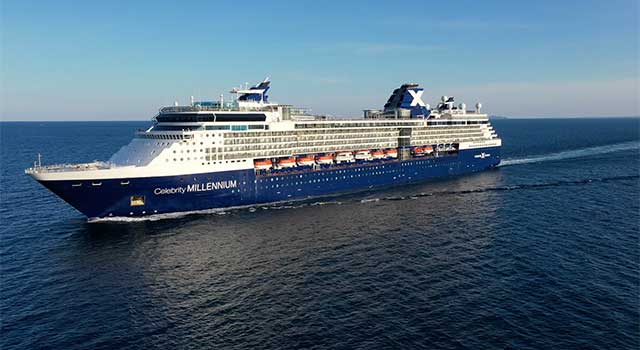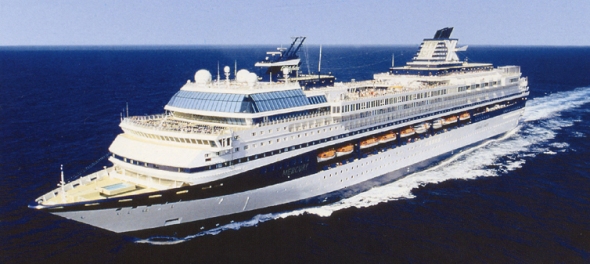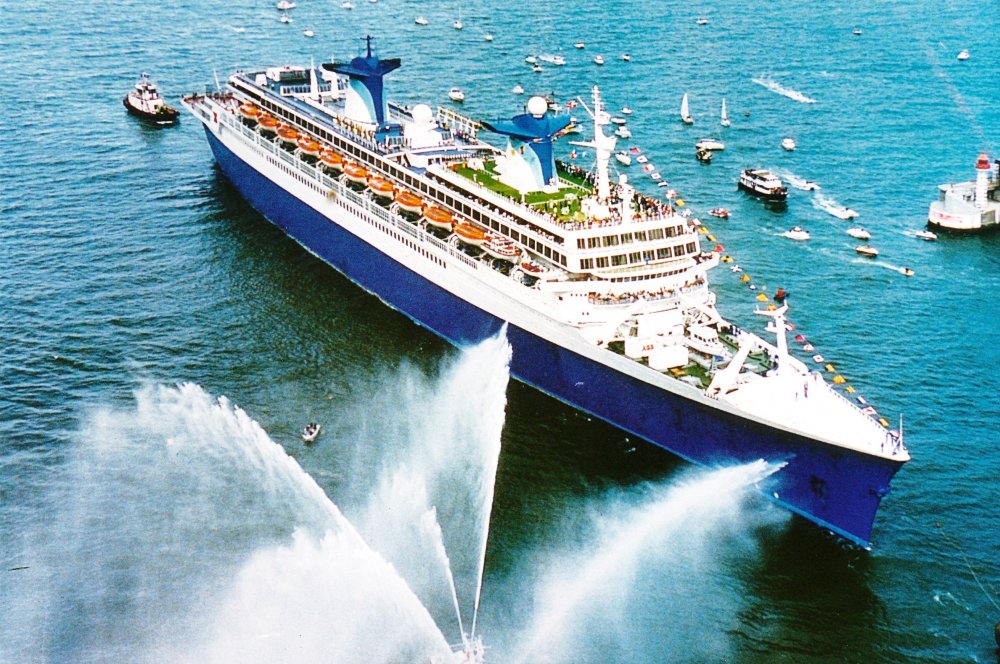
JeffB
Members-
Posts
1,073 -
Joined
-
Last visited
-
Days Won
6
Everything posted by JeffB
-
Call It: First Cruise Sails.......????
JeffB replied to CJS2766's topic in Royal Caribbean Discussion
This is such a complicated question to even make an educated guess. So many variables, not the least of which is the arbitrariness of the CDC. They have a huge hang-up on congregate settings being cauldrons of disease spread. Well, they are and always have been. What the CDC seems to be missing is that while they live in a status-quo state regarding infectiouos disease, everything with regard to COVID is changing faster than they can keep up. So, the answer to the question is then a two step one: (1) When the CDC gets a dose of reality. Look, the observational evidence is overwhelming that adequate protections from SARS-2 spread among vaccinated people exists to the point where they should realize that SARS-2 is rapidly approaching the nuisance stage that bugs like Norovirus, seasonal influenza and cruise cough have lived in for years. Vaccinated people can congregate ..... period, full stop...... using the same hygiene protocols most people adhere to to keep from getting sick. Moreover, this is not a zero risk proposition. You might get sick, you might get COVID, but if you're vaccinated you aren't going to get seriously ill. (2) When the "technicals" of complying with the CDC's Safe to Sail requirements that the cruise lines say they are waiting for to be in receipt of any day now (right!) are in their hands and we see test cruises happening from FL and TX ports. Has anyone been able to collate the date on which the majors have avoided cancelling cruises in either June or July? Gut based guess in June is Friday the 11th-Sunday the 13th or in July, the 3rd - 5th. 3-5d cruises would be most likely to start on those dates, possibly 7d itineraries under the right circumstances. The tea leaves say passengers wishing to board will have to have proof of vaccination, possibly proof of previous infection by PCR and recovery by Anti-Body testing. A June start-up for revenue cruises requires the CDC to green light test cruises by mid April and then, cruise ships, in small numbers getting approved/certified safe to sail in around 6w time following that. Lots of things have to fall into place but, it's possible barring any vaccine delivery hic-ups or politization of decisions involving the safety of properly adapted congregate settings like baseball stadiums, indoor concerts and yep, cruise ships. But, it's going to be slow going. A single COVID case on a cruise ship in the testing and certification phase or on subsequent revenue sailings will up-set the entire apple cart. In other words restarting cruising from US ports is really hard. While I'm optimistic it could happen as early as June, so many potential pit-falls. -
JMO and you're going to have a better feel for this than I might em.down, but I can't see a realistic way, assuming Southampton allows cruise ships to port there, that a trip through the Straights and into warmer cruising waters, say the Balearics or even the Canary's on the West Coast of Africa, such routes without port calls can be organized and executed. It sure sounds appealing though. Thoughts?
-
I posted last week about concerns regarding the Europe's rising COVID case numbers, excluding the UK which is not an EU member state. That concern is based on the impact on cruising from European ports, this despite the good news in the UK. Italy will go into full lock-down on Monday to curb rising COVID case numbers. They won't be the last EU nation to do this or at least suffer imposition of more restrictive COVID mitigation measures. Cruise ports aren't going to open up in countries we long to re-visit or visit for the first time. In fact, American ports may open before European ports even though, in general, EU member state's health authorities have been more pro-cruise tourism than our own CDC has been. Meanwhile, at home in the US, optimism for a return to some form of normalcy by July 4th (Joe Biden's goal for Independence from COVID day) or possibly as early as May according to some experts, is a result of the stunning success of both the vaccines themselves but also the impressive roll-out of them. There's still some disorganization and lack of coordination among dispensing agencies and businesses but people who track this stuff think vaccines will be widely available by mid-April to everyone that wants one and is over 16. The EU? Vaccine distribution disaster, predictable public health retrenchment along with the curtailment of mobility and social contact. Unless this picture changes within the next 30 days or so, I fear what optimistically looked like a return to cruising in Europe and the Med by July isn't going to happen.
-
I'm usually the bearer of good news, not bad. I had hoped, with the success the UK is having with COVID and with more accommodating governments to the plight of countries with economies that depend on cruise ship tourism, that Europe would beat the US to the punch and open its cruise ports. Probably not. The EUC is getting pummeled for it's mismanagement of the roll-out of available vaccines to EU member states. The news today carried reports that Norway and Denmark have halted vaccinations with the AZ vaccine over fears of blood clots. I suspect this report is premature, not entirely accurate and fits the MSM's profile of publishing stuff like this. But, it's nonetheless troublesome with respect to opening European ports to cruise ships. When I read things reflective of public health policy among European nations I'm usually impressed but, there is still a penchant within the EU for quick retrenchment when things look like they are going down hill. In Germany, for example, there's always backlash from the states when Merkle declares a tightening of mitigation measures to respond to local outbreaks and the fear that they will spread across the country. A bit of an over-reaction IMO given the successful testing and tracking strategies that Germany's public health agencies have demonstrated in the past. The German public is as sick and tired of COVID and what many citizens now realize are unnecessary mitigation measures as we are here in the US. Recent COVID related events however lead me to believe that cruise port openings with resumption of cruising is going to be low on the priority list of things to re-open as COVID circumstances improve - and they will. That still doesn't erase the real risk of spreading infections in congregate settings, even though these can be substantially mitigated to render them reasonably safe (fact!) if not with zero risk. What's worse are public perceptions of the dangers of cruising in the COVID circumstance, even though those perceptions can be and most are, completely without basis, will steer public health policy in the EU. We're living with that in the US. The EU is rapidly approaching the craziness of US Public Health policy that's brought cruising to a halt out of the US.
-
A comment on the variants and vaccinated people: Everything I am reading that goes beyond the shock and awe headlines the press likes, e.g., "NEW VARIANTS INFECTING THE VACCINATED" stated as if this if scientific fact. News Flash: It's not! Virologists do have legit concerns about the variants. However, the consensus appears to be that the current ones (there are 4-6 depending on how you count them) are known to increase transmissibility. That is the only aspect of the variants studied enough to give weight to that conclusion. The rest you can dismiss as premature and mostly uninformed, meant to be scary click bait from the MSM. The 6 variants come from three original viruses in 3 lineages. That means that vaccine developers only need to deal with a limited number of tweaks to their vaccines to make them go from pretty good to very good. Those are my terms. They are vague because if I more definitively defined them, it would take me a couple of pages. Generally, there is a ton of misinformation about the vaccines; there's a ton of information on the web if you'd like to understand the differences between the main ones and why just being "65% effective" is very good and 55% effective (e.g., against the Brazilian Variant) is still pretty darn good. The FDA bar for approval of vaccines is 50% effective; flu vaccines are 45-55% effective. The rare few that have been re-infected after vaccination by a variant have had no or mild symptoms. I think in the entire world, there is only one person that got re-infected that was hospitalized. There have been no deaths (caveats about how countries report apply). It's becoming clearer every day that we're not goin to eliminate SARS-2; it will be controlled with sporadic outbreaks that we will be well prepared to deal with; most illness coming from being infected will be mild. Yes, vulnerable people will die from it ..... jsut like they die from being infected with influenza. Perspective. What impact does this have on cruising? If cruising resumes and you are comfortable with what you will have to deal with and the health risks you are assuming by cruising/traveling, go cruising. You can talk your self out of most things if you seek endeavors that involve no risks. Whne it starts back up, don't let cruising be one of them because of what the lay press says about COVID. I think I'm preaching mostly to the choir here.
-
Interesting. Needs careful examination. The UK has had great success in curbing the spread of the virus. Other EU nations have not fared nearly as well despite what I would call reasonable mitgation measures short of a lock-down like the UK implemented to stop the spread of the UK Variant. In Italy, that is what is apparently driving a sharp increase in news cases and hospitalizations. Greece is in the same boat so is Norway. Spain (Barcelona) and the Netherlands (Amsterdam), Portugal (Lisbon) seem to be holding their own. I mention these countries (cruise ports) because a relaxing of cruise travel in the UK is pretty meaningless without a similar relaxation in other countries where the cruise ship related tourism is a big part of those county's economies. A slow roll-out of vaccines is not helping. Australia, New Zealand, some of the Middle East, the US and Asia are completely separate discussions regarding if and when cruises will resume full scale in each of these countries/regions. My concern is with a meaningful resumption of European sailings. While it's encouraging to see a sensible approach to the cruise industry from UK health authorities, unlike what we are living though with the CDC in the US, Its not time for dancing in the streets just yet. It's a start but will have very limited impact on the kind of robust cruising we all left behind over a year ago.
-
The area of testing, aside from the complexity of the actual tests themselves, how they are officially described is fraught with the same kinds of language, terminology and definition problems that tests are. Context first. There are three purposes generally understood by epidemiologist for testing in viral epidemics and pandemics (1) Diagnosis, (2) Screening and (3) Surveillance. Different tests are more suitable for each of the three purposes although neither the CDC or the FDA mandates a certain test for a certain purpose. What the FDA does do is regulate their use. If you have ever worked in a lab that processes samples of blood, sputum, tissue, etc. for medical purposes, you know what CLIA is (short for the Clinical Laboratory Amendments of 1988 Statute of the Public Health Services Act.) CLIA is how the FDA accomplishes oversight of clinical lab testing. When a test is used for one of the first two purposes above the FDA establishes quality control standards, e.g. how accurate does a test need to be to serve the purpose for which it is intended. Diagnosis of COVID requires the most rigorous standard for sensitivity and specificity. Diagnosis requires 100% in both categories and RT-PCR tests approved by the FDA are the only tests that meet that standard. Screening requires a less rigorous standard. The RT-PCR, a molecular test, is very much used for the sole purpose of arriving at a diagnosis that is 100% correct. The obvious reason for that is that in a hospital or LTC facility, among other specific places, you have to know this with a high degree of accuracy that a COVID diagnosis is correct. Screening has less rigorous standards and therefore less accurate tests, such as antigen tests, are suitable. The FDA has not established lab standards for surveillance testing. That brings us to embarking on a cruise ship. Does the company operating that ship need a diagnostic test or a screening test for passengers and crew entering the ship? What the cruise company is trying to do is reduce the risk of becoming infected with SARS-2. They are not trying to completely eliminate it. In some settings, yes, you don't want that bug around at all. Use a diagnostic test. In others, reducing the risk of infection to the lowest practical level should be the goal and layering of of other mitigation measures with reasonably accurate testing products, like cruise ships plan on doing, is the best way to do that. So, you tell me which kind of testing you think is needed and which kind of test is best for that purpose? Like I said, be careful about what the CDC has to say and what guidance it issues.
-
Yes ..... again the CDC was involved. The problem was bad reagents by design. I don't have the nitty gritty details but it was a bad screw up and had an impact on early testing and tracking that had they gotten this right, if we had gotten masking right, we wouldn't be where we are now.
-
Interesting. I don't see that an RT-PCR COVID test is required in the snap-shot of the page you posted. Just that it is a SARS-CoV-2 test. The 2-3d window for pretests certifying you don't have COVID has become the standard window that most countries and conveyances are using, if they require COVID testing, enter/board. Was the requirement for an RT-PCR COVID test somewhere else in the FAQs?
-
I think the CDC would bend on the PCR requirement. It really isn't practical as a pre-boarding requirement. Maybe post sailing as it appears Quantum is doing but that would depend on what local health authorities demanded. I also think that since the CDC made that cruise ship requirement for PCR testing, knowledge about types of testing and how to surveil effectively rather than diagnose has become better understood. To be frank, I've learned to question most of the CDC's guidance, not dismiss it, but look carefully at it. Their most obvious blunder was over masks but I think Trump pressured the CDC on that one. There have been plenty of other examples where their public statements based on modeling they subscribed to and guidance provided has been shown to be inaccurate or wrong.
-
Great response, Joshgates. My unit had 120 officers and around 600 maintainers and support personnel supplying, repairing and flying 24 aircraft as well as doing the same things that typical human resource departments in large companies deal with and we did this all around the world. I dealt with all the things you listed that telecom (and I'd assume any large company) deals with including NDA, in my case classified information. I'd argue scale doesn't change the requirement for great leadership. General Eisenhower and Jack Welsh were cut from the same cloth - great leaders - you and I can both name people we've worked with in smaller organizations that were run by great leaders. Yes, we disagree about RCL's stance on keeping future cruisers who have never cruised and loyalist informed. Love the friendly and informative interchange. Thanks.
-
I'd add this: I'll argue there's 99.9% chance that at start-up, to board, you'll require proof of vaccination or a negative COVID test possibly both. CLIA announced back last fall that all member lines had agreed on a requirement for COVID testing prior to boarding for both passengers and crew members. Several lines have announced all crew-members will be vaccinated. One line has announced all passengers and crew must be vaccinated. You may be able to use a post-sail RAPID Antigen test from your first cruise to board your 2nd cruise. But it gets complicated. See below. It is less certain whether the requirement for testing will be a PCR test or a RAPID test or even required if proof of vaccination is required. I've read several articles on governments, mostly in Europe, struggling with how to implement "vaccine passports." One of the technical issues identified in the public domain, among many that Europeans working on this are dealing with is that new variants, capable of re-infecting vaccinated people, are out there. I want to emphasize that whether you can acquire a variant after vaccination AND transmit it is far from certain. There is anecdotal evidence that can happen but (1) such re-infections are rare and (2) symptoms have been mild and that implies low viral loads possibly not transmissible at all. Lots of truly unknowns here that we'll learn more about in the next 3 months. if it is required for boarding, there is plenty of uncertainty and an equal amount of confusion regarding terminology even among infectious disease experts. For example, what kind of test, how far in advance can you get it, will it be provided by the cruise lines in the terminal at check-in, will there be an added cost to you from your cruise line. Again, lots of unknowns that are being called "technical issues." Regarding terminology review this here - its from the CDC and IDSA (Fauci's home and in this case he's precise). These are US Government official terms but you may not find them being used routinely if you ask a clinic, for example, what should be a simple questions, "what kind of testing do you do. You may or may not get the answer you need. https://www.idsociety.org/covid-19-real-time-learning-network/diagnostics/rapid-testing/ Where are you sailing from? Port Everglades in Fort Lauderdale and Port of Miami have nearby, no appointment needed COVID testing clinics offering both kinds of RAPID COVID Tests. A Google search around the port you are leaving from will tell you what you need to know if you need to get a test on your own. The short of it from the link above is that there are both RAPID Antigen tests (results in 15-30 minutes) and RAPID Molecular tests that don't use the same Reverse Transcriptase Polymerase Chain Reaction (RT-PCR) process but have the same diagnostic reliability as a test done using the RT-PCR process have. It's the RT-PCR process that takes up to 72h for results. RAPID Molecular tests that ID the same COVID RNA that RT-PCR tests do with the same reliability produce results in around 30 minutes. They should both be acceptable, hihg reliability, diagnostic tests. Terminology caveats apply. I've seen these advertised. Compared to a RAPID Antigen test that costs $50-100 and Medicare covers them (as well as the RT-PCR tests), the RAPID Molecular tests cost upwards of $250. Medicare probably doesn't cover these. Commercial insurance might. Sorry for this long post but none of this is simple and it deserves thorough explanation so you've got some of the facts on the question you asked available to you.
-
Sure. I spent 20 years in the USMC and commanded a fighter squadron before I retired in 1990. The best leaders operate with controlled boldness. That means you evaluate the facts at hand affecting a course of action, look at risks and benefits then embark on it. Most importantly, if your plan fails, you accept responsibility for it and make no excuses. In general today's leaders, and I include Fain in that group, are overly timid fearing the consequences and the need to be accountable for failure. No successful military campaign, no successful program implemented in the public or private sector was undertaken fearing failure and the need for accountability if such an undertaking failed. There isn't nearly enough of that around. So, RCL doesn't get a pass from me when it comes to telling a loyal following what's up. YMMV.
-
Understood ....... I should have been less specific when I named "execs" as being less than transparent. I believe cruise fanatics like us, the people the lines are depending on to keep making advance bookings in the face of COVID uncertainty, that we might get information more detailed than we are optimistic or that we are expecting technical information from the CDC any day now. It doesn't have to come from Fain's lips or any one in his immediate chain. It could come in the form of information releases in the COVID sections of the RCL web site or as personal letters to loyalists who want to feel like their continued loyalty is important to those execs. That we know virtually nothing about contingency planning or plans being considered beyond pop-up announcements via emails that your cruise has been cancelled or modified or whatever bothers me. On every cruise I have been on in the last 5 years or so, there's been a future cruise plans presentation that identified where ships would be, what itinerary's would be offered and what new plans were in the works. It was detailed. Now, you'd think ships movements and plans, upcoming itineraries and so forth a military secrets ..... and they may be for proprietary and competitive reasons. But, if I were in charge, I'd ease up on the secrecy if only to keep those advanced bookings coming. There's a way to do that I would think.
-
Yeah, it's definitely a trend driven by efficiencies in hull and superstructure design less so by looks. I didn't like it at first when Celebrity brought out Apex but I've gotten used to it and rather like it. I'm an avid sailor/racer. A good 5 years ago, mono-hull design adopted the X-Bow shapes. It made quite a difference in hull performance on the race course just with that simple design change.
-
That's a good question. Watch COVID metrics nationally and internationally - continuing declines in these will foreshadow changes in government public health policy. The opposite is also in play. Upward trends in the metrics, problems with vaccine distribution will cause retrenchment. The CDC will respond to those and different messaging from Fauci and Walenski will signal that the CDC may take a different stance on their no-sail-order. That will be well before RCL makes any major announcements if they make any. Assuming metrics are favorable, before RCL or any of the lines make major announcements, we will know when crews start moving from their homes back to points of embarkation for re-training and I'd expect this will be on a pretty small scale but large enough so that leaks on crew movement will make it to cruise blogs like this. I don't expect RCL to announce test-cruises, JMO. That's because what do they say if the make a major announcement about them and then the CDC fails a ship or 2? As ships pass muster, I would assume RCL will announce that and at the same time name ships and their itineraries. We're a ways off from that. For now, my advice is to watch COVID metrics nationally and internationally and then pay attention to the chatter on the various cruise web sites and blogs. Informative stuff will leak and be reported.....one way or the other.
-
Ahh yes, the squared off or X-Bow - another modern naval architectural feature. These hull forms have the advantage of allowing maximum length waterline for ships of comparable sizes which means the highest possible hull speeds. The Axe and X Bows, have less spray of water at entry and also have less pitching motions and slamming reduction is quite significant. This creates quite a comfortable experience for passengers. The fuel consumption is also reduced by a significant factor and this bow can operate quite efficiently in medium sized wave ranges mainly because of the larger part of the ship volume being above and upfront, directly impacted upon by the waves.
-
Finally, I still favor Celebrity's Millennium class ships for a number of reasons. They still feel smallish and intimate. They still look like nautical, sea-going vessels on the outside and retain an intimate feel on the inside. For a while, Celebrity maintained the specialty dinning option that was born on the Century class ships: Replicas of the dinning rooms featured on SS France, United States and Normandy. Those are long gone, again, sadly.
-
This is the first ship I cruised on in 2001. Celebrity Mercury. Like another poster here who liked RCL's Majesty of the seas, I found Celebrity Century class ships gorgeous inside and outside. Unlike today's monstrous and often gaudy interiors Mercury felt like a ship in the true sense of the word. When Century left Celebrity's fleet not too long ago, I was deeply saddened. Mercury (Mein Schiff) and Horizon are still sailing with other companies. A testament to both their continuing architectural appeal and good bones.
-
Interesting comments on the feel and look of a cruise ship - pools not being a defining point for a cruise ship at all for me. I'd call myself a traditionalist. This is the proper design for a cruise ship. SS Norway, previously SS France. From a design standpoint, it's a far cry from the current "hotels on barges." From a functional standpoint the old ladys of the seas are no match for the current technological marvels that sail the oceans. Of course it represents the nautical architecture of the time and that was a fleeting time for cruising and what turned out to be a short reincarnation of the Golden Age of Cruising.
-
Well, it goes back to the House now for their stamp of approval before it goes to the President's desk to get signed into law. Then, it will be official. It should get passed (D's have a 10 vote margin) but don't be surprised if there's some R shenanigan's designed to prolong passage. Unless the Biden administration can no longer stand on their caution about easing mitigation measures, even about sensible easing of them like Texas is doing and FL has done from the gitgo, unless there's unequivocal proof in the next week or so that, despite this state level easing, downward trends in COVID metrics are persisting, I don't think the messaging will change much. Just small hic-ups are going to cause over-reaction.
-
Thanks Matt for your front page post on S.593 - Representative Murkoski's push to get past the 1886 PVSA Law for her home state, Alaska. I can't disagree with others here who've posted that the bill has little chance of passing and fixing the technical problems in PVSA, unless it's a rider added in the House to the latest COVID Relief Package. The biggest thing for me is that presenting legislation like this continues to challenge the unnecessary and economically burdensome provisions of the CDC's no-sail-order. Fain's comments, although milk toast, coupled with the fact that RCL is still holding on to most of it's summer Alaska itineraries, tells me that, well, there's still a chance. Maybe he knows stuff he can't talk about. That would go right along with the secrecy and what I consider a lack of transparency about the state of cruising from RCG/RCL execs. Regarding an opportunity to start test sailings in May, I remain seriously concerned with the direction that the Biden administration appears to be headed with it's pandemic messaging via Fauci and Walenski (CDC). IMO, enough observational data from the UK, Israel, the UAE, even the US (third behind Israel and the UK for vaccine roll-out success), places that have had a high percentage of their populations inoculated, demonstrates the vaccines are reducing disease burden and spread of the virus. Moreover, after more than a year of this thing, there's a ton of facts and expert views that lock-downs and shuttering businesses don't change COVID metric outcomes greatly while the economic costs aren't off-set by benefits derived therefrom. Yet, the CDC, even Biden himself, pushes back when states start sensibly lifting them and waits for more studies before they can endorse such moves. That approach isn't helping to push the CDC off the turf they've staked out with the no-sail-order. Frustrating.
-
No question Twangster ....... still, my point stands. Anything that pushes the CDC off the turf it's staked out regarding the no-sail-order is a positive. I admit a strong bias toward re-openings in general but, IMO, the CDC's position on prohibiting the cruise industry from operating from US ports is becoming increasingly tenuous. Some may argue being exposed as making unreliable or scientifically unsupportable COVID recommendations and mandates hasn't stopped them from doing so in the past and even currently if it serves an administration's political purposes and they'd be right. Still, I think the cruise industry's willingness to explore sailing from less restrictive foreign destinations is a threat to a vital sector of the US economy that involves travel and leisure activities.
-
Correct ....... but I can see impetus for opening the ports in question should S.593 be passed say, as an add on amendment to the COVID Relief Bill. What's the economic benefit to Alaska's tourism industry of passing S.593 if the no sail order isn't lifted allowing cruise ships to sail from Seattle and into and out of Alaskan ports?








